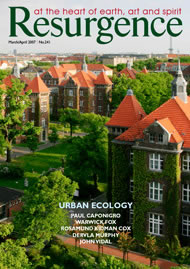FIFTEEN YEARS AGO Richard Tarnas published what still is the most clear and readable history of the Western intellectual adventure in a single volume, The Passion of the Western Mind. Now he has released another colossal book. Cosmos and Psyche harvests thirty years of research and challenges one of our most deep-seated assumptions: the view, pervasive in science, education and the media, of the cosmos as a soulless, impersonal and unconscious background.
There are at least four books contained in this one. The first few chapters articulate the most lucid analysis I know of our contemporary cultural situation, against the background of the whole unfolding of the Western mind, and pointing to the self–world split at the root of our many current crises. Next we find a revisioning of Jungian and archetypal psychology, showing the limiting Kantian assumptions ingrained in Jung’s thought, clarifying the notion of synchronicity and extending archetypal psychology into our cosmic environment. A third book within this volume is a revisioning of the astrological tradition in the light of modern and postmodern
developments. Finally, the fourth and most central research contained in
Cosmos and Psyche is an extremely detailed, almost encyclopedic analysis of the Zeitgeist of dozens of cultural and historical periods in relation to archetypal patterns that seem to unfold in close correlation with specific astronomical alignments. This is substantiated by a formidable mass of evidence, strongly suggesting deep connections between human events and astronomical rhythms. Freud opened up a completely new field with his groundbreaking (and at the time deeply challenging) The Interpretation of Dreams, and Tarnas does something comparable with his careful and erudite interpretation of cosmic archetypes.
In spite of obvious links with the astrological tradition, there is no
relation here with sun-sign popular newspaper horoscopes. Words like ‘Scorpio’, ‘Sagittarius’ or ‘Capricorn’ are never mentioned in the whole book. According to Tarnas, “the planets do not ‘cause’ specific events any more than the hands of a clock ‘cause’ a specific time. Rather, the planetary positions are indicative of the cosmic state of archetypal dynamics at that time.” Already Plotinus wrote that “the stars are like letters” in a world that is “full of signs” and where “everything breathes together.” No deterministic world is espoused here, but a fully open participatory universe, a cosmic web of synchronicities in which
microcosm and macrocosm mirror each other.
Cosmos and Psyche focuses on how certain astronomical alignments (‘transits’ in astrological parlance, particularly those of the outer, slow planets) seem to be reflected in personal lives and cultural events. For instance, the
spirit of the 1960s, which sparked off a swell of interest in ecology and in new or renewed forms of spirituality (and saw the birth of magazines like Resurgence), coincided with a Uranus–Pluto planetary alignment, active throughout 1960–72. Archetypally these two planets seem to correlate with impulses towards emancipation, innovation and radical transformation. This
Uranus–Pluto alignment was at work in previous times that showed a comparable Zeitgeist, such as 1787–98, with the French Revolution pervasive aspiration for Liberté, Egalité, Fraternité. This cycle is now coming back into alignment during 2007–20, and it could bring the right archetypal climate for all the high hopes and good seeds of the 1960s to take root and give fruit.
In the last ten years, landmark works like David Abram’s The Spell of the Sensuous, Derrick Jensen’s A Language Older Than Words and David Kidner’s Nature and Psyche have been reflecting and kindling a growing awareness that nature is not a mere sum of molecules obeying physical and chemical laws, but a living, sensuous and ensouled matrix in which we fully participate and belong. Tarnas’ Cosmos and Psyche extends this rising awareness beyond the bounds of the biosphere. Our psyche is deeply connected not only with our immediate natural environment, but with the whole of the cosmos encompassing us, with the rhythms of the planets we can see above us on clear nights. We live in a meaningful and purposeful universe, whose subtle rhythms resonate within us and with us. Searching beneath the depths of the psyche, Tarnas has found the heights of the cosmos. Ultimately, cosmos and psyche – like nature and psyche – have never been truly apart.







